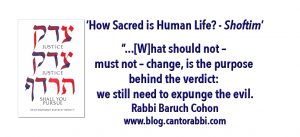HOW SACRED IS HUMAN LIFE? – Shoftim, Deut. 16:18 – 21:9
by Rabbi Baruch Cohon
Appropriately named Shoftim – Judges, this week’s reading deals with principles and practices Moses teaches us about what is justice and how to enforce it.
One theme that gets repeated in this section says: “Expunge the evil from your midst.—uviarta haRa mi-kir-bekha.” That is not just the theme of his teaching, it is the motivation behind all of it. If someone is convicted of a capital offence – including murder, rape, leading others into idolatry, or presenting false evidence to get someone else punished – and the offender is found guilty, then that offender, whether male or female, must be executed. Why?
Doesn’t every human being contain the Divine image? How does a violent death cancel out an offense, even if that offense was equally violent?
True, killing the criminal makes him unable to repeat his crime. But that’s not enough. Not for Moses, and not for Judaism.
If Hatfield kills McCoy, and McCoy Jr. kills Hatfield in return, that’s not justice. That’s revenge. And Torah law went into considerable detail in the last couple of weeks to limit the power of revenge. In Moses’ time, the accepted practice was for the next-of-kin to have the right and the duty to hunt down his kinsman’s killer and take his life. Revenge killing. But Torah law limited that right to very specific circumstances. Above all, it limits the valid motivation for the return killing. Not revenge, now. But “Expunging the evil.”
Take the case of a criminal who plotted to get his neighbor in trouble.
“As he plotted to have done to his brother, so let it be done to him,” says Moses.
“On the word of two witnesses or three witnesses shall the condemned be executed. He shall not die on the word of one witness.”
“And all the people shall see, and they will not presume [to violate] again.”
Never mind the fact that we all have sacred souls. By our own violations, and by credible eye-witness testimony of our fellows, we can desecrate those souls, and bring on the violent punishments described in this reading. Not because society is taking revenge on us, but in order to expunge the evil.
Execution methods in many parts of the world have become much milder than they were in Torah times. No longer do they consist of just stoning, burning, beheading or hanging. And long years on death row were certainly unknown to Moses. But what should not – must not – change, is the purpose behind the verdict: we still need to expunge the evil.
Evil is there. It is our job – all of us – to get rid of it.



